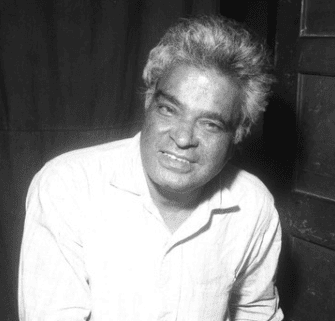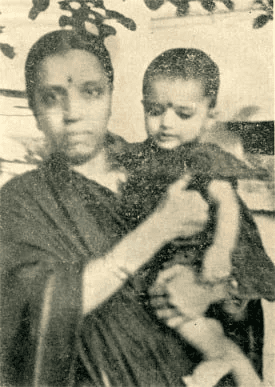Ka.Na.Su (Ka.Na. Subramaniam) is one of the pioneers of literary criticism in Tamil. This is a collection of his writings on women's literature from different periods. This collection includes writings on Yadugiri Ammal, Anuthama, Krithika, Hephzibah Jesudasan, and R. Soodamani. These are the ones available at present. If you search for Ka.Na.Su’s unedited writings, you may still find more.

Ka.Na. Subramaniam
A writer who should have been mentioned here is Ambai. In the English translation of Tamil short stories compiled by Ka.Na.Su. and published in 1978, he had added only one story by a woman writer, that was Ambai's 'Amma Oru Kolai Seidaal'.
– Srinivasa Gopalan
(1) Yadugiri Ammal
Recollections of Bharathi

Yadugiri Ammal
One day, Pudumaipithan and I were sitting with an old friend, deep in conversation. Since the friend was also a writer, our discussion naturally revolved around literature; old and new. At some point, one of us, I don’t recall which, asked if he had ever seen Bharathi in person. The friend replied that he had seen Bharathi from a distance once or twice but had never met him up close or gotten to know him. Yet, a month later, the same friend began publishing a long series in a popular magazine, vividly recounting various encounters with Bharathi in grand, poetic fashion. I remember it went on for nearly twenty-five weeks.Since Bharathiyar lived in the recent past, and since it is easy to fabricate memories about him and compose meaningless folk songs praising him, any writing about him must be examined critically.
I am not saying that all Bharathiyar memoirs lack truth. There are a few that, as far as I know, shine with genuine insight. V.R. 's Bharathiyar Charitram, Chellammal’s Tavapputulvar Bharathiyar, and Yadugiri Ammal’s Bharathi Ninaivugal are a few of them. There may be others I have not come across. Of these, Yadugiri Ammal’s Bharathi Ninaivugal, though it does not cover Bharathi’s entire life, vividly brings him to life by recounting events from six or seven crucial years. Understanding a poet as a person is no easy task. Their longings, desires, satisfactions, and inner turmoil are often beyond the grasp of ordinary reasoning. The explanations people offer for a poet’s actions are rarely accurate.
No one today considers the English writer Samuel Johnson a great man, yet the biography written about him is regarded as a masterpiece. Boswell achieved something unparalleled in literary history. It is said that he and Johnson shared such a deep mental affinity that separating them was impossible. Similarly, Yadugiri Ammal, the eldest daughter of Mandayam Sri Srinivasacharyar, Bharathiyar’s companion and benefactor, was blessed with a rare closeness to the poet. As a child, she spent years near him in Puducherry, receiving his love and affection. In her memoir, she does not analyze Bharathi from a scholarly distance. She simply describes the poet as she knew him in her childhood. And through this child’s words, we see Bharathi in a way few others have conveyed. Children often grasp and express truths that elude adults.
Yadugiri Ammal recalls:
"The doctor advised me to walk for an hour every morning along the beach to regain my health. So, I followed his instructions. I would leave my child with my mother and go to the shore, accompanied by my father and sister. One day, I heard a song from somewhere. The melody was so hauntingly beautiful that it melted my heart. It sounded like Bharathiyar’s voice.
There he was sitting on a boat. Dressed in a black shirt and a belted vest, his hands folded in prayer, he was singing while gazing at the rising sun over the sea. The morning light was dim, not yet fully spread. The song’s majestic tune, its soul-stirring raga, and its profound meaning sent shivers through me. It was as if a divine presence had descended before me. My heart stood still.
Bharathi: “I came here at night. I was soaring in a fantastical world of imagination. When I awoke, the beach was cold. I was lost in the ecstasy of Thiruvaimozhi… and then you called.”
Sri Sri (bored): “Everyone at home worries about you constantly. But you live in a world of fancy. How is this right?”
Bharathi (tilting his head): “The sun’s harshness was unbearable. The beach… the fantasy …it was an escape from everything.”
My father spoke to Bharathi in English. He did not reply. But his eyes welled with tears. That moment has never left me.
On the way back, my sister asked my father:
Ranganayaki: “Sir, why were Bharathi’s eyes so full of tears? Did he cry? Why?”
Sri Sri: “Must have been the sand blown into his eyes”
Me: “Sir, Bharathiyar was out all night, but Chellammal didn’t say anything?”
Sri Sri: “This is hardly the first time. God only knows how many nights he has stayed away from him… as he wandered the seashore, the grove, and the pond.”
Me: “Sir, why is he not the same as before? I’ve seen him since I came from the village. There is such a disorder in his house.”
Sri Sri: “Don’t ask Chellammal or Bharathi anything. They are already troubled enough.”
That evening, Iyer (V.V.S. Iyer) arrived. I told him what had happened.
Iyer: “Did he recognize you as soon as you called him?”
Me: “Yes, he did. But he was startled… I’m puzzled about what is to be done. Maybe you could talk to him.”
Iyer: “When he gets a new idea, he does not think twice, he does it. His wife could somehow manage her children and the household, but in our country, a husband cannot be overruled. If the head of the family acts with justice and virtue, things will be fine. But when he indulges in mischief, the home becomes a prison filled with weeping, grumbling, and suffering. The wife cannot abandon her children, nor can she push her husband away. Caught in this moral entanglement, the man looks for a way to escape, losing himself in fantasy, indulging in Lahiri Vastu (drugs), and building castles in the air.”
Me: “The ragam he sang was beautiful.”
Iyer: “A bronze voice… the morning… the birds chirping… the roaring sea. He must have sung gloriously. But the company of sages and wanderers drag him in different directions. A strong man controls his mind. But one who follows the restless monkey that is his mind wherever it leads, brings neither good to himself nor those around him. Some lives take this path.”
Saying this, Iyer sighed. I did not understand everything. It all felt like a tangled mess.
I have included this long passage to illustrate Yadugiri Ammal’s ability to narrate events with clarity and depth. In this book, we see Bharathiyar in many roles; poet, reformer, family man, reckless wanderer, and friend. She also recounts how he sang Moondru kaadhal keeping up with the beat of the Band players performing in front of the Dupleix statue in Pondicherry. Likewise, she traces the origins of many Bharathiyar songs we now know.
Yadugiri Ammal has narrated many such incidents in vivid detail. The uniqueness of her memoir lies in how each story brings Bharathi to life, not just as a poet, but as a man.
When Yadugiri lost her child, she met Bharathiyar again. At the time, he was in the midst of a fifteen-day vow of silence. Instead of speaking, he wrote on a piece of paper:
"It is our sin to see you without a child!"
I looked at him closely. A mere skeleton. Red eyes. A frail body. It was unbearable to see him in such a state.
He wrote again and showed me:
"I am practicing yoga in a new way. That is why my body is weak."
He had just finished writing the disrobing of Panchali portion from Panchali Sabadham. Bharathi sang it aloud. Though he would not speak during his silence, he expressed himself through dramatic reading of his poetry.
Chellammal was distressed by his vow. In response, Bharathiyar wrote:
"I’m silent under an artistic spell but chellamma doesn’t understand it. She makes a fuss."
“Who do you talk to on the beach?” I asked.
He laughed and replied, “With Parasakthi, with the sea.”
Tamils, who are content with simply building a memorial hall for Bharathiyar, have made little effort to engage with his poetry in a true literary sense. Even less effort has been made to understand the man behind the poet. This small book by Yadugiri Ammal is invaluable in helping us see Bharathi’s humanity.
Credits:
*Excerpts from the essay collection of Ka.Na.Su first published by Srinivasa gopalan, editor of Azhisi. Azhisi publishes rare books that haven't seen reprints, unpublished works of great writers and literary classics. It was founded in 2017. Srinivasa Gopalan also writes critical essays and articles in various magazines.
*This essay was also published in the feminist literary magazine Neeli, in February 2025. Neeli is a Tamil, online magazine, edited by writer Ramya, which publishes critical essays, articles and interviews centering women writers, thinkers and social figures. https://neeli.co.in/
